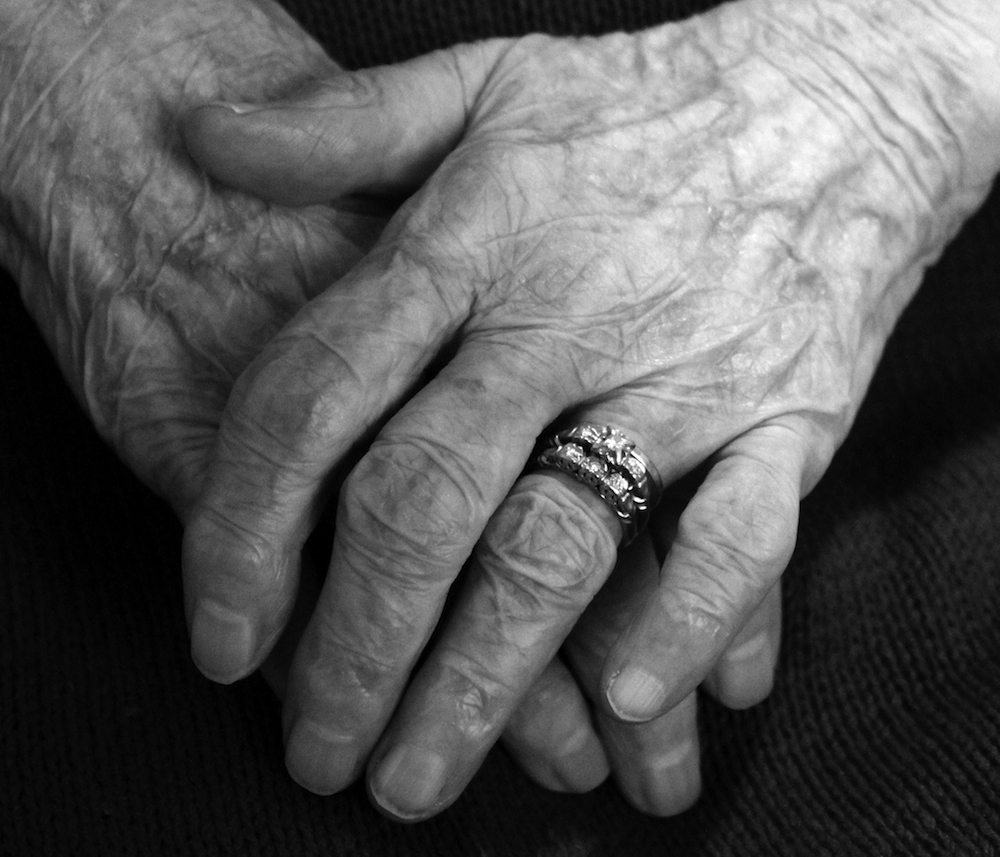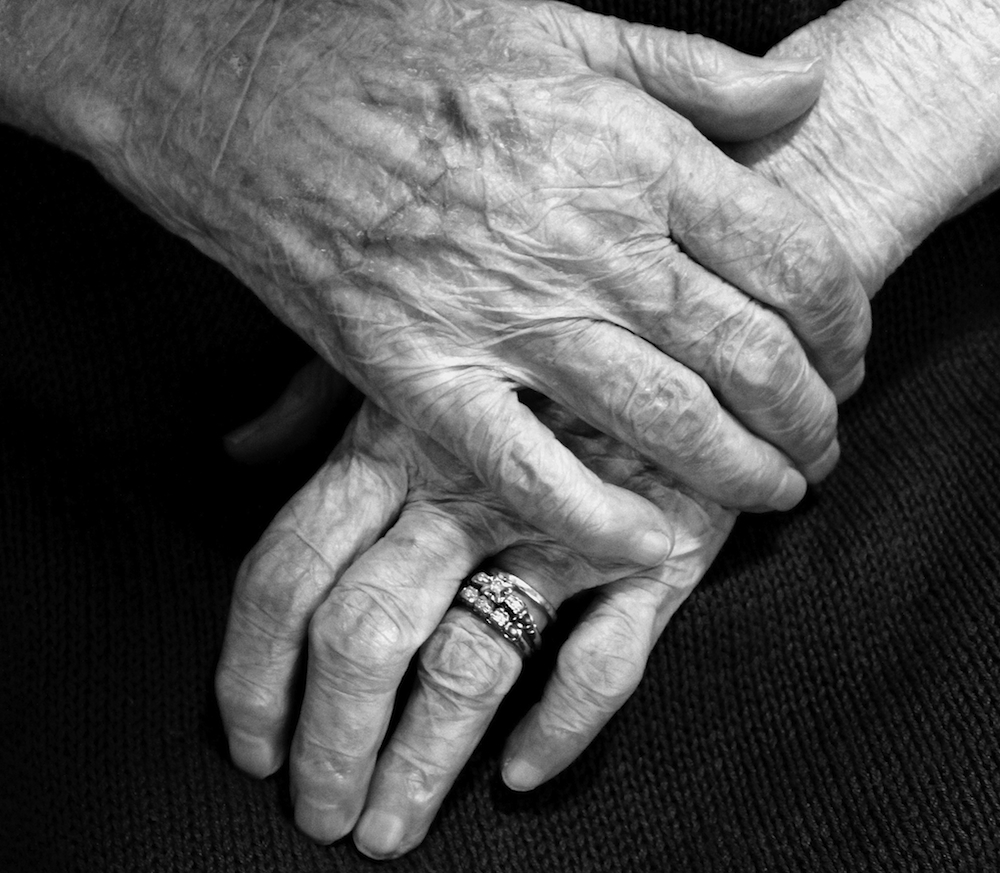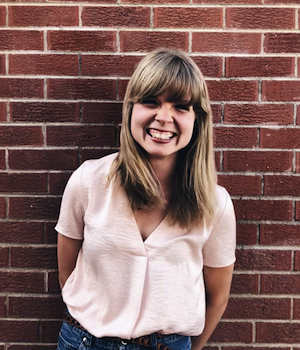Essay by Cherie Nelson
Walking and Praying on a Thursday Morning

Nancy outlines a square block of downtown Zanesville, Ohio, in the humidity of early summer. With a Captain D’s Seafood plastic bag in one hand, she reaches past her knock-knees to pick up used napkins and Maker’s Mark bottle wrappers as she prays.
Nancy is one of three Methodist women over the age of sixty who believe that God stuck around after a dying economy left only abandoned mills and generations of poverty here. They walk South 7th Street to Main to South 6th to South Street on Thursday mornings and pray, because they think it does something. They do it every Thursday morning, even in the winter, Nancy is quick to add when I ask. I don’t know these women. They are friends of friends in this place I am merely passing through.
I tell those who ask that I’m here to write. I’m staying on my best friend’s couch, free rent for a summer in the middle of graduate school. But this is only partially true. My best friend lives here and has told me about the poverty, about the way hopelessness flooded into the spaces left behind when industry died in the 1950s. She’s told me about the way shards of broken pottery still wash up on the riverbanks in 2017, nearly seventy years after the factories closed. She’s told me these women would be glad to have me walk and pray with them as they try to make room for hope.
I don’t believe this works, but I’m compelled by the whimsy of their attempt. I need to see for myself. I want to be proven wrong. I’m taking a summer to observe the world tucked in the folds of the Appalachian foothills, to be bitter toward irrelevant and silent steeples and their cloistered occupants, to immerse myself in new stained-glass spaces to affirm this bitterness.
Today, Nancy is the only one who comes to pray. I meet her in the Trinity United Methodist parking lot in the heart of Zanesville’s crumbling downtown. She invites me to walk and pray alongside her as she strolls the perimeter. Instead, I follow behind.
I watch Nancy’s hands from a distance: three feet, give or take a few, to the back right, street side. Trying to keep enough distance to see her but to remove myself from any obligation to participate, to read how she moves. Nancy’s hands make contact with the edges of the Jericho she encircles, waiting for trumpets, mimicking the rhythm of her prayers, the adamant assertion of the things she is asking. Wrinkled skin hangs from the underside of her biceps, dancing with each gesture.
When her hands still, when Nancy bows lower than her back’s natural rounding, I see them—crooked knuckles, knobby and bent off to the side. The backs are covered with tissued skin, light-brown age spots breaching the surface, thinly hiding her tendons and bruised blue veins. A tarnished gold ring with three stones sits on her left ring finger, even though she tells me she was divorced many years ago.
As we continue to walk, her hands stroke red crumbling brick and tap the tops of iron fence posts, bent and weathered from one collision or another. Her arthritic fingers appear to be treating the world like braille, as if there is something here worth being read closely, worth tracing with one’s entire body. She stops at each building, and I’m amazed by her intimacy with these places. I hear her praying for the landlords, for the plumbing, for the bugs that have gotten into the foundation. Her hands continue to direct her supplications: that they would be wise and gracious, repaired, exterminated. Amen.
I can’t stop watching her hands. I won’t pray. I can’t pray with her, skeptical of the go-to fix from my religious upbringing, the one I've grown up and out from under as I’ve seen its futility: petitions presented and unanswered, people repeating “Please God, just” instead of stepping out and doing something to answer their own request for the world.
But these prayers seem different. There is a boldness in their futility that compels me. Nancy somehow knows of the flooding in the next building we approach, prays the damage will be fixed. She thinks God concerns himself with crumbling brick.
I write these prayers in the notebook I keep in my back pocket along with a list of the things Nancy touches. I try to create a framework to understand fingers that press up against each other in stained-glass manger reverence and also brush the piss-soaked walls of the tax service alley. Nancy reads each paint-chipped frame between dusty window panes, not forgetting even those of hidden doors between vacant storerooms. She touches places I’m sure haven’t been acknowledged by anyone else for years.
As we walk, I notice Nancy’s hands begin to deviate. We turn the corner from Main to South 6th Street, to the lived-in block of the otherwise vacant downtown, and Nancy begins to read people. Arms outstretched, she reads their shoulders with her fingers—strangers, friends, people spotted on the sidewalk in ones and twos, cohabiting on the cement outside the soup kitchen, in front of apartments that seem to be sliding off their frames.
Again and again, she reaches out her hands as we pass, and I cringe. I look down at the ground and into store windows to avert my eyes, see bright green weeds coming up through cracks of exhausted pavement, the World War II gas mask in the antique store I have yet to see open, the crushed bird in the curb’s seam.
She can’t be thinking what I’m thinking: about what the touched person is thinking, what her touch symbolizes to them as she strokes their shoulders over and over, what gives her the right to touch someone or see someone like she does, about the unearned intimacy of her reading—about where her hands have been, where their bodies have been, the whole list of things church people like her have done to harm and help people here.
How much easier it would be to give a half smile and nod, to not hold too closely the gaze of anyone else. To let go and believe that some places are dead and hopeless and it is futile to try resuscitating them. To leave some distance. She doesn’t. She doesn’t, and my eyes are drawn back from their hiding place, unable to look away from her hands.
I watch her touch the man who calls out this is what you do when you lose your house as we approach him. She runs her fingers down his navy sweatshirt, through and over the dried snot on his sleeve. What is your first name? she asks, and he tells her first and last, the same found in the court record of the Zanesville Times Recorder. He tells her the address of the house he lost, the one his transient neighbors will later tell us was taken because of the drugs and prostitution ring, something that doesn’t seem to move Nancy when she hears. She draws a line from the top of his shoulder to the bottom of his deltoid, again and again, paying no attention to the white cobwebs of dried mucus I can’t look away from.

I see her reach for the bare-chested man with the homemade tattoos and the dog that doesn’t respond. He calls his dog—Lele, Lele come back here—but nothing. Nancy strokes between faded green “Kristy” and “Danny Boy,” her hands on his leathery, exposed skin. It makes me sick to see the way the ink runs and bleeds past the tattoo boundaries, the way Nancy doesn’t see her imposition, doesn’t see that this may make him uncomfortable, doesn’t see past his presence.
She tells him a joke about dog bites and exclaims the punch line: That isn’t my dog! They both laugh on the street, Nancy reading the space between his tattoos on each inhalation. I pray for you, I pray for you and everyone in this apartment every week. She grabs his shoulder, emphasizing the weight of her statement. His smile begins to fall down at the edges, pulled down by the word “pray.” He thanks her cautiously, flatly, while backing up his dissolving front porch stairs to end their conversation.
Her hands find the man with the black-and-green rosary, and the woman who passes a cigarette from her lips to her fingers to his fingers to his lips. Nancy strokes them both in turn. His left arm, then her right, waist bent at a ninety-degree angle to reach where they sit on the curb. She holds the man’s right hand, chalky and dried skin outlining his knuckles and ridges. After they pray—bless him, amen—she touches his companion’s shoulder, and they talk about God and the big sexy car she wants. Nancy pauses, looks up, and then smiles. Well, something-something, and God will give you the desires of your heart. She taps in Morse code on the woman, forgetting the first part of the verse.
I search dusty memory, attempting to help, but these once-familiar words have evaporated for me, too. Nancy tells the woman about her divorce and the pills and the time she didn’t think life was worth continuing. She tells her about the way hope filled up these cracks anyway. She touches the woman one last time, starts to walk away, and then remembers. Turning, she calls back: Delight yourself in the Lord! That’s the first part!
Nancy tells me about the way she touched the woman in the nursing home, Steve’s mother, as if I would know who that is. We walk by what I learn is Steve’s house, by peeling doors, by the alley with the bat bones and abandoned clothes. I’m told Steve’s mother is isolated in a nursing home with an antibiotic-resistant staph infection. Her fellow Nazarene congregants haven’t come to visit, haven’t come to bring her communion. Nancy says she can’t fathom not being able to partake. So she brings the woman body and blood—or their Methodist representation anyway. The thought of the infection, the puss-filled boils, the skin-to-skin contact, makes me wince. I imagine Nancy stroking the woman’s shoulder, sitting beside her, the woman’s swollen and sore-covered hands inside her own. I just washed them afterward. Nancy shrugs and continues her shuffle down the road, while I’m left to wonder where else those hands have been.
An hour later, we arrive back at the church parking lot. The marquee in front of us reads Ordinary People Extraordinary Lives. I write it down in my back-pocket notebook, next to the prayers, the people, and the walls that Nancy has touched. As I’m writing, I feel the weight of her hand on me for the first time, resting heavily on my shoulder before sliding down to grab my arm above the elbow. I empty my hands, placing my notebook in my back pocket, and slowly reach across to grab her arm as well.
I gaze down at my own hands for the first time since I started watching Nancy’s. They look aged far past their 25 years, with loose ridges of skin that mountain up around the knuckles, three freckles on their backs, lines of scarred white smoothness from knives and branches and rocks. They are the hands of a near-stranger, friend of a friend, an observer, who walks three feet, give or take a few, behind and to the right, street side. Hands that haven’t been able to fold themselves with the command “close your eyes and bow your heads with me” for some time, because it seems futile to pray to a God about debugging and new owners and restoration for the collapsed back half of the building, at least in a hopeless, dying, Appalachian foothill town like this.
These hands don’t touch people or shoulders or disintegrating brick. They write in a back-pocket notebook about cleaning the dirt and filth of overlooked spaces. They would hide cemented in my pockets while walking around Zanesville, if it wasn’t for Nancy with the Captain D’s bag, reminding me to pick up trash, saying there might be something worth seeing underneath. I’m embarrassed to be seen with her, embarrassed that I’m not like her. But these hands belong to the person who finds herself following Nancy regardless.
She sees the church marquee too and reads it aloud. Ordinary People Extraordinary Lives. She pauses, then scoffs. Yeah, probably, her laugh hollow and full of disbelief. She looks at me, and her face softens. She removes her hand from where it’s been resting on my left side and pulls me into a full embrace. Releasing me, Nancy looks, not at my hands, but into my eyes. She nods and purses her lips into a smile.
I watch as she turns and starts toward her car, shuffling across the scourged parking lot, trampling the weeds bursting up through asphalt lacerations, plastic bag in hand.
Art Information
- "Mom's Hands 1 and 2" © Danna § Curious Tangles; used by permission.
 Cherie Nelson has her MA in English Literature and is an MFA candidate in Creative Nonfiction at Colorado State University.
Cherie Nelson has her MA in English Literature and is an MFA candidate in Creative Nonfiction at Colorado State University.
Follow Cherie on Twitter @cher_nel.
